Demo In Gaza Turns Tense As Journalist Faces Threats From Hamas
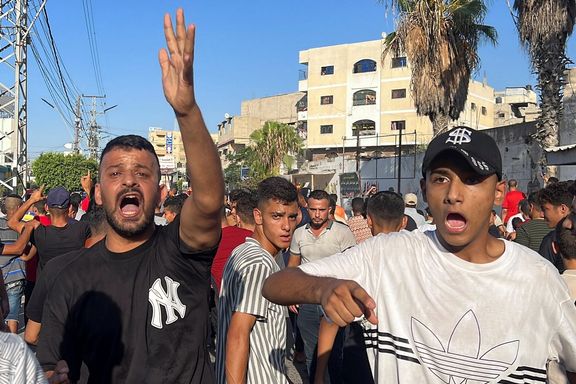
A group of children openly mocked Hamas during a demonstration in Gaza on Sunday, provoking threats to journalists.

A group of children openly mocked Hamas during a demonstration in Gaza on Sunday, provoking threats to journalists.
A video on social media shows the children chanting "Shia! Shia!" in reference to Hamas' alleged ties with Shiite Iran.
Amidst the demonstration, Ihab Fasfous, a veteran Gaza journalist, found himself at the center of a confrontation with Hamas, the governing authority in the Gaza Strip.
According to witnesses, he was threatened twice by the authorities and then demanded to see identification documents of those making the threats. Despite this, he was later arrested by Hamas.
The situation has raised concerns among media organizations, particularly the Palestinian Journalists Syndicate, which has strongly condemned the actions of Hamas security forces against impartial reporters. In a statement, the syndicate also addressed an incident involving journalist Walid Abdel Rahman, a prominent member of the General Secretariat of the syndicate. Rahman, a correspondent for Palestine TV was reporting on a march in Jabalia refugee camp when he was beaten by Hamas security forces. This incident reflects a growing pattern of preventing journalists from performing their duties and covering peaceful marches across the Gaza Strip.
The Palestinian Journalists Syndicate said, "We strongly condemn the attack by Hamas security forces on journalist Walid Abdel Rahman. It is unacceptable that journalists are being subjected to violence and intimidation while simply doing their job. The syndicate stands in solidarity with all journalists facing such threats and calls for their immediate release."

Iran's has once again warned regional countries against normalizing relations with Israel as efforts intensify to expand the Abraham Accords to include Saudi Arabia.
During his weekly press conference Monday, Nasser Kanaani, the spokesperson of Iran's foreign ministry, said that normalization of ties between Saudi Arabia and Israel would harm regional peace and stability.
His remarks came as US President Joe Biden said July 28 that a deal may be on the way after talks his national security adviser held with Saudi officials in Jeddah on the issue.
The Islamic Republic, Israel's sworn enemy, has always opposed normalization of relations between Arab countries and the Jewish state. The regime has repeatedly described the two-state solution – perhaps the only peaceful way to resolve the conflict between Israel and Palestinians -- as a betrayal of the ‘Palestinian cause.’ Top Iranian officials in the past have called for the annihilation of "the Zionist entity.".
“It is quite clear that strengthening and stabilizing the position of the Zionist regime in the region has been America's first priority for many years," Kanaani said, noting that the United States has succeeded in establishing relations between Israel and several regional countries. “But what happened in practice was allowing the Zionist regime to increase its crimes against the Palestinian nation,” he claimed.
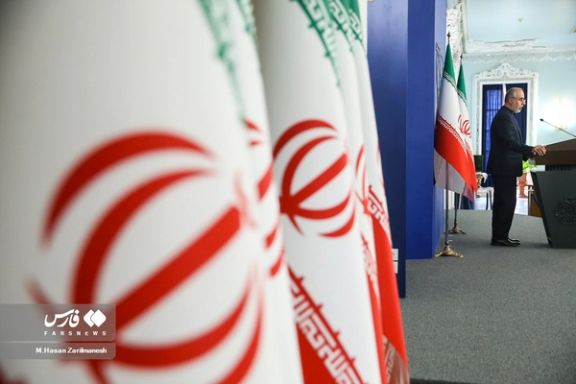
“Peace with the Zionist regime will not help the Palestinian nation; Iran considers any step taken towards the recognition of the regime neither in the interest of Palestine nor in the interest of peace and security in the region,” Kanaani said in a tacit threat that could potentially lead to further unrest in the region by Tehran’s proxies.
In June, Jaber Rajabi, a political analyst and activist, told Iran International that although the Islamic Republic seeks to portray itself as sympathetic to the Palestinians and championing their cause, it never supports those Palestinians who seek peace and stability, such as the Palestine Liberation Organization, and only supports militant groups.
Rajabi said that the Islamic Republic is not committed to what he described as the Palestinian cause, noting that the regime views the Palestinian issue as a bargaining chip. Among the few cards that the Islamic republic can play in the international arena is fomenting unrest in Israel, he claimed, adding that the regime believes it can only make gains if there is a crisis.
In April, Supreme Leader Ali Khamenei claimed that Israel is on the defensive, and the United States has suffered major setbacks and consecutive defeats in the region.
During the Monday press briefing, Kanaani also claimed that Iran is pursuing a policy of good neighborliness and seeks to resolve disputes with neighboring states through dialogue. However, he reiterated that the regime will not tolerate a violation of its rights over a disputed Persian Gulf natural gas field shared with Kuwait and Saudi Arabia.
Called Arash in Iran and Durra or Dorra by Saudi Arabia and Kuwait -- the offshore field was discovered in 1967 and is estimated to have a total proven reserves of around 310 million barrels of oil and 20 trillion cubic feet of gas. Kuwait and Saudi Arabia insist that Iran has no right over the field, claiming “exclusive” right, while Iran says any development without its consent is “illegal” according to international laws as it claims 40 percent of the field located in its territorial waters.
“Iran believes that such issues should be discussed within the framework of technical, specialized, and legal negotiations and that it is not helpful to raise them in the media,” Kanaani emphasized.
His remarks – as well as similar ones by the country’s oil minister on Sunday – came after Kuwait's oil minister Saad Al Barrak told SkyNews Arabia July 27 that his country will start drilling and begin production at the gas field without waiting for border demarcation with Iran, reiterating the two Arab countries’ position that Iran must validate its claim to the field by demarcating its own maritime borders first.
As controversies surrounding the case are escalating, the disputed maritime field in the Persian Gulf has become a litmus test for the recent détente between Tehran and Riyadh.

The two men recently detained in India for planning to attack a Jewish center in Mumbai are suspected to be linked to Iran’s Islamic Revolutionary Guard Corps (IRGC).
The suspects planned to carry out bombings at several sites including the Chabad House Jewish Center in Mumbai, which was the site of a deadly attack in 2008.
Mohammed Imran and Mohammed Yunus Saki were apprehended in Pune in possession of explosives, drone equipment, laptops, and incriminating books in Arabic.
The investigation into the local Islamist terror group known as Al-Sufa led to the arrests, with documents discovered on one of the suspect's phones. The Chabad House was targeted in 2008 by Islamist Pakistani gunmen during a series of attacks in Mumbai, resulting in the deaths of seven people.
Apart from the 2008 Chabad attack, there have been other terror attacks on Israeli and Jewish targets in India. In 2021, a blast outside the Israeli embassy in New Delhi damaged cars but caused no injuries, with India attributing the attack to the Quds Force branch of Iran's IRGC.
During the past two years, Israel foiled attacks organized by the IRGC-affiliated agents in countries including Georgia, Turkey and Cyprus all aimed at killing citizens of Jewish origin.
Israel's National Security Council has also warned of continued attempts by Tehran to target Israelis worldwide, particularly in countries near Iran in West Asia, such as the United Arab Emirates, Georgia, Azerbaijan, Turkey, Bahrain, and Iraq's Kurdistan region.
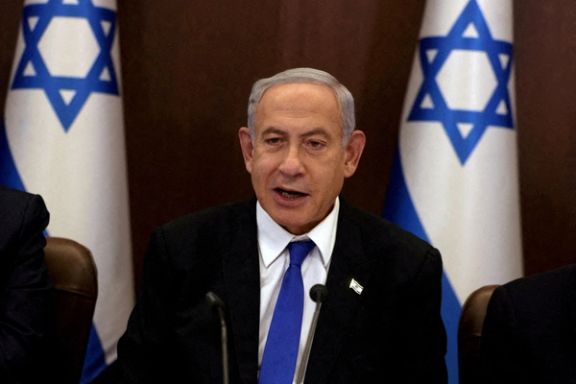
Israel's army would rally and unify in the face of any threats by the Lebanese Iran-backed Hezbollah, Israeli Prime Minister Benjamin Netanyahu said on Sunday.
Netanyahu made the remarks during a cabinet meeting, amid growing tensions along Israel's northern border with Lebanon and as the country's military faces threats to its cohesion over the government's attempts to weaken the judiciary.
Since Israel’s current political crisis began earlier this year, Iran and its militant proxies in the region have rallied to take advantage of any weaknesses. Large-scale military clashes took place between the Palestinian Islamic Jihad, a Hezbollah ally, and Israel in early April.
“As for (Hezbollah leader Hassan) Nasrallah's bunker threats, we are not impressed by them. On the day we are tested, he will find us standing together, shoulder to shoulder, and even Nasrallah knows that neither he nor Lebanon should put us to the that test.”
Reuters reported last week that Iranian military and security officials recently held a meeting with Hezbollah and Palestinian Hamas to see how they can take advantage of Israel’s internal problems. The Revolutionary Guard’s (IRGC) Quds Force attended the three-hour meeting, as Israel’s foes see an opportunity in Israel’s political turmoil related to Netanyahu’s judicial reforms.
Iranian government media and officials have been highlighting large protests in Israel against the judicial reforms by heralding the imminent collapse of “the Zionist entity.” They have also been openly encouraging Palestinian and other militants to intensify their attacks inside Israel.
With reporting by AP, Reuters
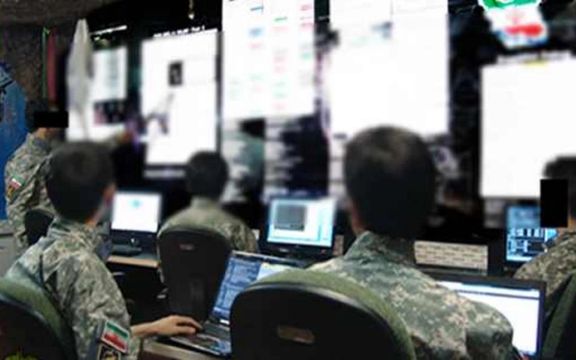
Israel’s Shin Bet internal intelligence agency says it has thwarted a phishing campaign by Iran targeting primarily Israeli civil servants and researchers.
On Sunday, the agency disclosed some information about the LinkedIn-based campaign to infect the victims’ computers with malicious software and gather information.
The Iranians created false profiles posing as real Israeli citizens with whom the targets may have had personal or professional interactions. Then, they initiated conversations on LinkedIn and continued correspondence through email, according to the agency.
During their correspondence, the impostors would send an invitation to a conference or other digital files of interest, such as a study or article. Clicking on these links would then infect the recipient's computer with a malicious file that would grant the Iranian entity comprehensive access to the compromised system, enabling remote takeover and complete exposure of the information contained within.
Israeli-based news channel i24NEWS cited Shin Bet as noting that he hackers originally compiled the necessary information for the LinkedIn profiles from social media networks, allowing them to establish a connection and then engage in correspondence tailored to the target's specific interests.
The campaign is just the latest in a series of similar operations by the regime’s cyber agents against Tehran’s archnemesis Israel. Iran-sponsored cyberspies have recently boosted their techniques, using fake personas of real people to add credibility to the phishing emails designed to deliver malware.
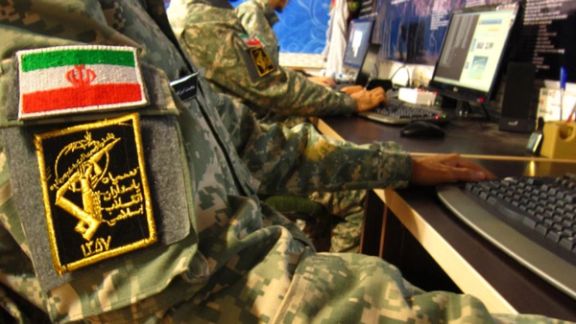
Mehdi Saremifar, a Canada-based sci-tech journalist, told Iran International on Sunday that the cyber-attacks by the Iranian regime’s hackers during the past several years indicate that several organizations or institutions in Iran are coordinating their efforts for such campaigns. He says the country’s intelligence ministry and the cyber army of the Revolutionary Guards are among the units involved in the regime’s warfare in cyberspace.
According to Saremifar, Iran’s attacks are mainly aimed at phishing and getting ransom as well as some for military intel, a case of which led to a drone attack against an oil tanker associated with an Israeli billionaire off the coast of Oman in November 2022.
According to a 2022 report by Security firm Proofpoint, Iran-aligned agents deployed a social engineering impersonation technique, informally called Multi-Persona Impersonation, in mid-2022 in which the threat actor uses at least two stolen or hijacked personas on a single email thread to convince targets of the legitimacy of the campaign. The personas used are real people that the target knows and trusts.
Last August, Meta, formerly the Facebook company, removed at least two Iranian cyberespionage groups that were targeting academics, activists, journalists and other victims. Also in 2022, Iranian hackers -- named Sharp Boys -- targeted several travel booking sites of an Israeli company and stolen personal information of more than 300,000 Israelis.
Earlier in the year, researchers at CheckPoint's Incident Response Team said an Iran-linked group calling itself Moneybird has deployed a ransomware against Israeli organizations.
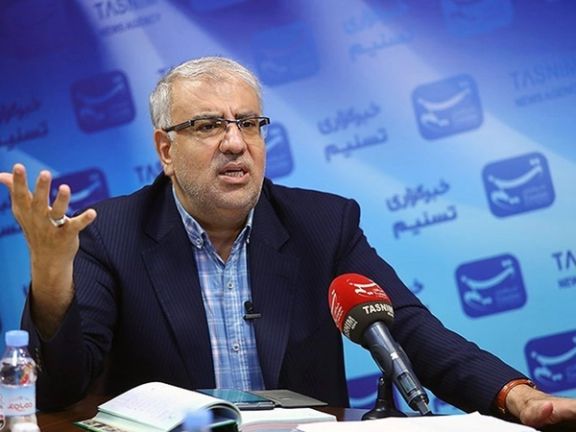
Iran’s oil minister says Tehran will pursue its rights over a disputed maritime field in the western tip of the Persian Gulf shared with Kuwait and Saudi Arabia if they shun cooperation.
“If there is no willingness to cooperate, Iran will pursue its rights and benefits, including the exploitation and exploration of the Arash gas field, and will not tolerate any violation of its rights,” Javad Owji said on Sunday, according to the Oil Ministry’s SHANA news agency.
Called Arash in Iran and Durra or Dorra by Saudi Arabia and Kuwait -- the offshore field was discovered in 1967 and is estimated to have a total proven reserves of around 310 million barrels of oil and 20 trillion cubic feet of gas.
Kuwait and Saudi Arabia insist that Iran has no right over the field, claiming “exclusive” right, while Iran says any development without its consent is “illegal” according to international laws as it claims 40 percent of the field located in its territorial waters.
Kuwait's oil minister Saad Al Barrak told SkyNews Arabia July 27 that his country will start drilling and begin production at the gas field without waiting for border demarcation with Iran, reiterating the two Arab countries’ position that Iran must validate its claim to the field by demarcating its own maritime borders first.
As controversies surrounding the case are escalating, the disputed maritime field in the Persian Gulf has become a litmus test for the recent détente between Tehran and Riyadh.